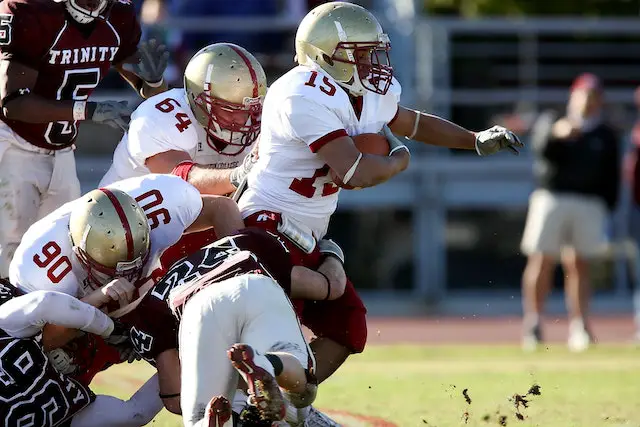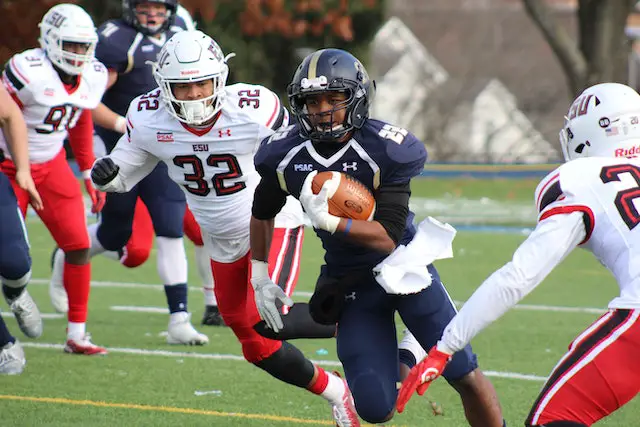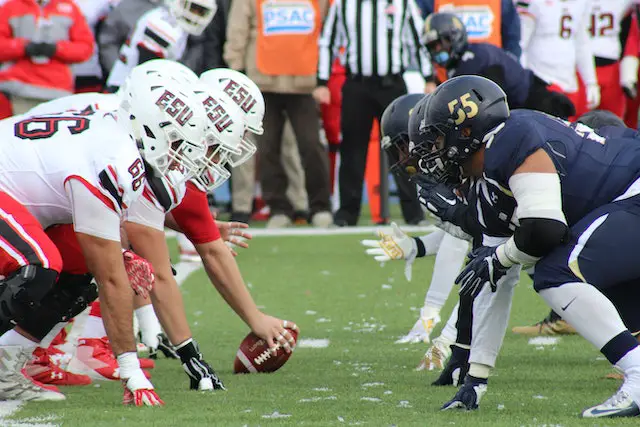Can NFL Refs Bet On Games?
National Football League referees cannot bet on games. The NFL has strict rules forbidding gambling of any form, including by those who officiate the contests.
Understanding The Role Of NFL Referees
Referees in the National Football League (NFL) are essential to maintaining fairness and safety during each matchup. As the highest professional level of American football, this league draws millions of devoted fans who tune in week after week to watch their favorite teams battle against one another.
Yet behind all this action and fierce rivalries, there exists a team of referees dedicated to upholding rules and integrity within the sport. We will explore their multifaceted role, detailing responsibilities, training challenges, and the impact of NFL referees!
Responsibilities Of NFL Referees
NFL referees uphold the game’s rules, ensuring all players, coaches, and officials abide by them. Their authority extends to making decisions on penalties, violations, and other infractions, which can enormously affect game results. Referees must possess a comprehensive knowledge of the rulebook and be able to apply it consistently and impartially while making their calls based on interpreting these laws; their decisions on disputed calls on the field ultimately fall under their purview.
One of the primary roles of NFL referees is to ensure player safety. Football is an aggressive and high-impact sport with many associated risks; referees must always monitor injuries closely to protect player well-being and minimize serious injuries as much as possible while keeping play within acceptable boundaries. Referees play an invaluable role in keeping their games within acceptable parameters while protecting player well-being.
Referees play an instrumental role in time management. Each quarter has a specific time limit that must be respected; referees oversee this clock to ensure smooth gameplay by starting and stopping the game clock, monitoring timeouts, and accurately timing plays. Time management is key to maintaining flow while preventing unnecessary delays or disruptions to proceedings.
Training And Qualifications
Becoming an NFL referee is a rigorous and competitive process involving experience, expertise, and a demonstrated aptitude for officiating. Many referees who cut have gained prior experience officiating lower levels, such as high school or college football, before progressing to professional officiating. This experience allows them to develop deep football knowledge while sharpening their officiating skills.
Not only must potential NFL referees gain practical experience, but they also undergo rigorous training and evaluation by the league’s officiating department. Training programs from this department cover rules, mechanics, and techniques of officiating, as well as clinics, seminars, and regular meetings to stay apprised of any rule changes and gain feedback on performance; additionally, physical conditioning is a must to keep up with the speed of gameplay.
Officials who want to remain NFL referees must consistently demonstrate a high level of competence and professionalism. The league’s officiating department will evaluate their performance regularly, and they may receive feedback regarding how well they performed compared with peers in their position. Those demonstrating superior performance may even be selected to officiate playoff games or the Super Bowl, the pinnacle of professional football!
Gambling Policies And Regulations In Professional Sports

Gambling has always been a part of sports culture, providing fans worldwide with excitement and engagement. Due to the potential for corruption and protecting the integrity of sports leagues like the National Football League (NFL), professional leagues have implemented comprehensive gambling policies and regulations designed to maintain fairness, transparency, integrity, fair play, and transparency of play, including player conduct regulations, league partnerships, monitoring mechanisms, education awareness programs, and technology applications used to enforce regulations such as these. We will explore these policies further here.
Player Conduct And Anti-Gambling Policies
The NFL places great emphasis on player conduct regarding gambling activities. To protect the integrity of its games, the league strictly prohibits all forms of gambling that might alter or undermine NFL results, such as betting on NFL games, associating with gambling establishments, or providing inside information to individuals involved in illegal gambling activities.
The NFL conducts thorough background checks on players and personnel (team staff, coaches, and officials) to enforce its policies. Furthermore, individuals must report any contact or solicitations related to gambling activities, helping to maintain transparency while identifying possible threats to game integrity.
Partnership Agreements Between Gambling Operators
The NFL recognizes the value of working closely with gambling operators to safeguard the integrity of the game. Through strategic partnerships and agreements, the league can establish cooperative relationships with reputable gambling operators who share data to detect irregular betting patterns or potential threats to its integrity.
By working closely with gambling operators, the NFL gains access to invaluable expertise in monitoring gambling activities. This collaboration allows it to detect any suspicious betting trends that might indicate attempts at manipulating game outcomes and initiate prompt investigations and intervention to safeguard game integrity.
Monitoring Mechanisms And Integrity Units
To effectively monitor gambling activities, the NFL has established specialized units dedicated to integrity and compliance. These units are responsible for implementing monitoring mechanisms to detect any irregularities or suspicious betting patterns. They analyze betting data while working closely with gambling operators to detect any threats or misconduct.
The NFL’s integrity units collaborate with law enforcement agencies, regulatory bodies, and other professional sports leagues to share information and best practices regarding emerging gambling-related issues, helping the league stay ahead of emerging trends and strengthen the overall integrity of professional sports.
Education And Awareness Programs
An integral component of the NFL’s gambling policies is informing players and personnel about the risks associated with gambling. Its comprehensive education and awareness programs provide insight into potential pitfalls associated with gambling and ways to maintain integrity when gambling occurs.
Through workshops, seminars, and training sessions, players and personnel learn about the risks of gambling addiction, the potential consequences of illegal gambling activities, and their effect on their personal and professional lives. These programs promote responsible gambling behavior and empower individuals to make informed decisions.
The NFL also encourages its players and staff to report any suspicious gambling-related activity or approaches, creating an environment in which people feel secure coming forward with information that could protect the integrity of the game.
The NFL’s Stance On Referees And Gambling

The National Football League (NFL) is committed to maintaining integrity and upholding fairness in its games with referees. Due to sports gambling’s growing presence, questions regarding potential impacts on referees and their roles in ensuring an even playing field have emerged.
We will examine how the NFL handles gambling involving referees by exploring its policies on referees and gambling as well as any steps taken by referees themselves, such as education and training programs provided for referee monitoring mechanisms, and potential consequences associated with violations of policies regarding referees’ and gamblers’ roles.
Referees’ Stringent Code Of Conduct
The NFL holds its referees to an extremely stringent code of conduct emphasizing professionalism, impartiality, and integrity. Referees are expected to uphold high ethical standards and refrain from taking actions that might compromise game fairness; furthermore, this code of conduct specifically prohibits gambling of any form as it could create conflicts of interest or compromise the league’s integrity.
Referees recognize their crucial role in maintaining fair competition, and any involvement in gambling activities would violate league policies and risk tainting their impartial status as arbiters. By upholding this code of conduct, referees demonstrate their dedication to upholding its integrity and earning players, coaches, and fans’ trust by fulfilling this role with professionalism and impartiality.
Preventing Conflicts Of Interests
To prevent conflicts of interest and preserve the integrity of its game, the NFL has implemented stringent regulations regarding referees and gambling. Referees are banned from participating in any form of betting involving either professional football leagues such as theirs, such as betting on games themselves, associating with gambling establishments, or providing inside information to individuals participating in gambling activities.
To implement these regulations, the NFL conducts comprehensive background checks and financial reviews on referees as part of their regular obligations. Any potential conflicts of interest or suspicious activities are inspected to guarantee impartiality and game integrity. Any referee found violating the gambling policies of the league faces severe repercussions, such as termination from employment and potential legal action.
Transparency In Making Decisions
Transparency is a core value in the NFL officiating process and is critical to protecting its integrity. Referees should make decisions objectively without evaluating outcomes to ensure that game outcomes are solely determined by players’ performances and compliance with rules.
To foster greater transparency, the NFL has implemented numerous measures, such as instant replay reviews and communication between officials on the field, to improve accountability while mitigating human error. These mechanisms enable the review and clarification of crucial calls while simultaneously minimizing any possible human mistakes on game day.
The NFL promotes open communication between referees and its officiating department. Referees have direct access to league officials who can offer guidance, clarification, or feedback regarding officiating decisions; this open dialogue ensures consistency while giving referees the support they need for accurate calls on the field.
Education And Training Of Referees
The NFL emphasizes referee education and training, equipping them with the knowledge and abilities required to officiate games with integrity and precision. Referees undertake intensive programs covering game rules, officiating mechanics, and ethical considerations.
Referees receive comprehensive training on their league’s gambling policies, such as their restrictions and any possible repercussions for breaking them. Furthermore, they receive instruction on any gambling risks or conflicts of interest that might impact their impartiality or credibility as referees.
The Role Of Technology And Transparency

Technology and transparency have become integral to modern sports, including the National Football League (NFL). Due to increased scrutiny and a desire for fairness, the NFL has embraced various technological advancements and transparency measures designed to increase accuracy when officiating matches and ensure accountability. We will examine these developments through referee wagers with instant replay, video review systems, wearable technology data analysis, and public communication impact analyses.
Instant Replay and Video Review Systems (IRVS)
Instant replay and video review systems have proven to be one of the most significant technological innovations for NFL officials, enabling referees to review critical plays more thoroughly before making more accurate decisions on the field. Instant replay has enormously affected game outcomes by providing referees with evidence-based decisions to change or confirm calls in real-time.
Referees use multiple camera angles and HD technology to closely examine various aspects of a play, including possession, boundaries, and touchdowns. This technology helps eliminate human error and provides a fairer outcome for both teams. Instant replay has become indispensable in resolving disputed calls, promoting fairness, and building the trust of players, coaches, and fans.
Wearable Technology For Referees
Wearable technology has debuted in NFL officiating, further increasing accuracy and efficiency for referees. Referees now have access to devices like GPS trackers, heart rate monitors that provide valuable data during games, and physical exertion monitors that ensure they can keep pace with fast-paced matches while making accurate calls.
GPS trackers enable leagues to analyze referee positioning and decision-making on the field, providing valuable feedback. Heart rate monitors provide invaluable data about stress levels among referees that can be used to measure their performance and well-being. Wearable technology enhances officiating and enables referees to maintain optimal performance throughout games.
Data Analysis For Officiating Improvement
Data analysis has become an indispensable component of improving NFL referee performance. The league collects extensive amounts of officiating decisions, such as calls, penalties, and instant replay reviews, and analyzes them to identify patterns, trends, and areas for improvement in officiating performance.
Data analysis allows the NFL to detect any bias or inconsistency in officiating and take steps to address it. Furthermore, this information can tailor training and development programs for referees who need improvement in certain areas. As such, data analysis helps ensure officiating decisions are based on objective evidence and promotes fairness across all games.
Public Communication and Accountability
Transparency and public communication play an essential role in NFL officiating, helping ensure the game’s accountability and integrity. The league endeavors to inform fans and stakeholders of all decisions taken regarding officiating while upholding transparency throughout this decision-making process.
The NFL fosters transparency through public communications from its officiating department. After each game, statements or press conferences are issued by this department to provide explanations or clarify interpretations of controversial calls or rule interpretations and allow greater understanding among fans, coaches, and players while building trust in officiating processes.
FAQ’s
Can NFL referees bet on games?
No, NFL referees are strictly prohibited from betting on any NFL games, including the games they officiate. The NFL has a comprehensive set of rules and guidelines in place to ensure the integrity of the game, and this includes strict anti-gambling policies for officials. Betting on games would create conflicts of interest and compromise the fairness and impartiality of the officiating process.
What are the consequences if an NFL referee is found to have bet on games?
If an NFL referee is found to have bet on games, it would be a serious violation of the league’s rules and code of conduct. The consequences for such actions can be severe, including immediate termination from the league and potential legal ramifications. The NFL takes gambling-related misconduct very seriously to uphold the integrity of the game.
Are NFL referees subject to any monitoring or investigations regarding gambling activities?
Yes, the NFL has measures in place to monitor and investigate any potential gambling activities involving referees or other league personnel. They have mechanisms to detect unusual betting patterns or any suspicious behavior that might indicate gambling-related misconduct. The league works closely with various organizations and law enforcement agencies to ensure fair play and protect the integrity of the game.
Do NFL referees receive any training or education regarding gambling-related issues?
Yes, NFL referees undergo comprehensive training and education programs that cover various aspects of their role, including ethical conduct and the league’s policies on gambling. They are educated about the potential risks and consequences associated with gambling, as well as the importance of maintaining impartiality and integrity in their officiating duties.
Are there any restrictions on NFL referees participating in other forms of gambling?
While the NFL has strict policies against betting on NFL games, the league does not prohibit referees from engaging in other forms of legal gambling, such as visiting casinos or participating in non-NFL sports betting. However, referees are still expected to exercise good judgment and avoid any activities that could raise questions about their integrity or impartiality.
How does the NFL ensure the fairness and impartiality of officiating?
The NFL employs various measures to ensure the fairness and impartiality of officiating. These include a rigorous selection process for referees, ongoing training and evaluation programs, and strict adherence to a code of conduct.
Referees are expected to make objective and unbiased decisions during games, and any violations of the league’s rules or policies are thoroughly investigated and addressed. Additionally, the NFL also employs advanced technology, such as instant replay and officiating command centers, to review and enhance the accuracy of calls on the field.

















